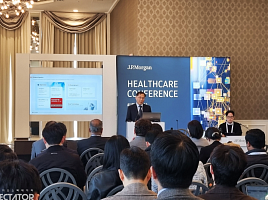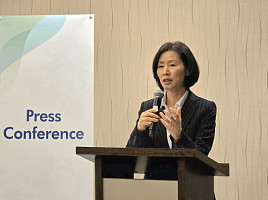기사본문
ABL Bio, unveil 'BBB shuttle antibody targeting α-Syn' preclinical data at AD/PD 2020
입력 2020-04-10 12:30 수정 2021-12-23 11:19
바이오스펙테이터 Sungmin Kim 기자

ABL Bio presented ABL301, BBB shuttle antibody targeting α-Syn for Parkinson's disease at the global conference of Alzheimer's disease and Parkinson’s disease named “AAT-AD/PD Focus Meeting" (advances in Alzheimer's and Parkinson's therapies) which is held from April 1st to 5th. ABL301 is a PD therapy new drug candidate for which an IND application is planned for upcoming first half of 2021.
The AAT-AD/PD conference will be run online due to the COVID-19 pandemic. With the official invitation, ABL Bio proceeded with poster presentations and oral presentations on the research results and efficacy of ABL301.
At the conference, ABL Bio presented the results of ABL301's safety in preliminary toxicity animal experiments and data that have improved motor skills in Multiple System Atrophy (MSA), as well as in Parkinson's disease, which has previously proven to be effective in treatment.
With the form of “2+1 bispecific antibody”, ABL301 is applied a bispecific antibody platform technology that across the BBB (blood-brain-barrier) to the aggregated alpha-synuclein (aggregate α-Syn) antibody in the brain that causes Parkinson's disease. It is known that existing target antibodies for brain diseases do not cross the BBB and only about 0.1 to 0.2% of them are able to pass. On the other hand, ABL301 uses the Grabody™-B platform, which is a type of "transportation vehicle," to increase the BBB permeability to a superior level compared to conventional single antibody treatments with obtaining positive in vivo animal data.
A remarkable data is that ABL301 demonstrated the platform's superiority with more than 10 times the BBB permeability of the conventional single cloned double-antibody, and obtained 8~9 times more value of the brain and cerebrospinal fluid (AUC) index than that of the control group. The serum half-life of the bispecific antibody was 118 hours, which was similar to that of the monoclonal antibody.
In the presentation of this conference, ABL Bio administered ABL301 for 90 and 180 days to the alpha-synuclein overexpressed Parkinson's disease animal model(α-Syn PFF injection model), which shows improvement on loss of the lewy body lesions and SNpc(Substantia Nigra) dopaminergic cells seen in Parkinson's patients' brains. This Parkinson's disease model is a successful reproduction of an animal model by ABL Bio designed by the team Virginia Lee, researchers at the University of Pennsylvania, a pioneer in neuroscience.
In addition, ABL301 showed positive data of improved motor function in PD model and accumulated α-Syn model (MBPα-Syn tg), which undergoes multiple system atrophy (MSA), a neurological disease with a poor prognosis in a motor dysfunction experiment.
Recently, ABL Bio has verified safety in preliminary toxicity animal studies through repeated administration, and further tested for efficacy in preclinical animal models and additional safety experiments. Also, ABL Bio is planning to submit an Investigational New Drug application (IND) in the first half of 2021.
ABL Bio will publish ABL301 and platform technologies through the presentation of the conference and papers.
At the JP Morgan Conference, the world's largest biotechnology conference held earlier this year, ABL Bio has attracted attention based on various bispecific antibody platforms, including ABL301, and held meetings with a number of companies, including big pharma, which is highly interested in the global neuroscience field.







